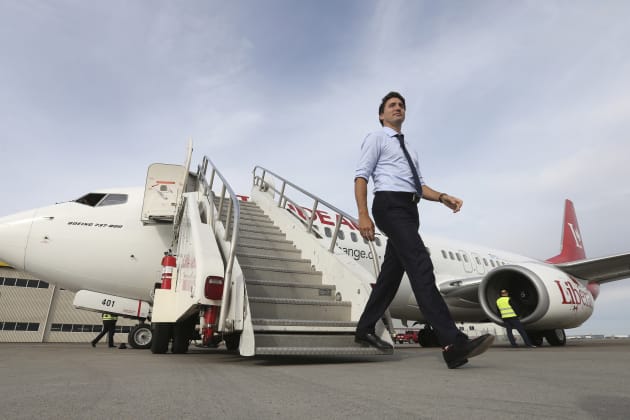
by
For years, Lebanese Canadians flying to Beirut have had to endure exhausting layovers in Europe. But recent hopes that the Trudeau government would approve direct flights to Beirut were dashed with a tweet from an Air Canada executive early Monday. Duncan Bureau, VP Global Sales for Air Canada tweeted that the government had rejected their application, commenting, “Huge disappointment for us and [the] Lebanese community here.” Bureau’s comments were echoed by the Lebanese community on social media. Comments to a post about the refusal on Facebook were both skeptical and critical. One individual wrote, “Trudeau will not be re elected in the next election. […] Pathetic decision Justin.” On Twitter another wrote, “Shame on @JustinTrudeau & @liberal_party for discriminating against the Lebanese-Canadian community.” Others were incredulous, and insisted on awaiting the official government response to an ePetition on the topic. That petition, sponsored by Liberal Lebanese-Canadian MP Eva Nassif, was launched last December and called for an end to Canada’s flight ban to Beirut. The petition garnered over 4000 signatures, and was presented to Parliament in mid-May. But the Trudeau government failed to respond to the petition within the standard 45-day window, and is under no obligation to actually provide an explanation.
It’s unclear why Canada should balk at approving the route, whether for security or other reasons. Indeed, it is a big disappointment — and a paradox — for Canadians wishing easier travel to Beirut. In a follow-up tweet, Bureau indicated that the Trudeau government had cited “security reasons” for the refusal. But as many have pointed out, British Airways, Air France, Lufthansa and many other airlines fly direct to Beirut, so it’s unclear why Canada should balk at approving the route, whether for security or other reasons. In fact, Canadians have good reason to question the government’s “security” justification for the refusal. In addition to the fact that many other airlines have provided direct service to Beirut for years without incident, direct flights from Canada to other “risky” destinations are commonplace. Air Egypt, for example, runs direct flights between Cairo and Toronto, even though a Russian plane departing Cairo was brought down in a suspected act of terror in late 2015. Likewise, Canada’s government allows direct service to Istanbul despite a terror attack at that city’s airport just last summer. Israel repeatedly trumpets the dangers of Hamas rockets — even comparing them to the Nazi blitz on London during the Second World War — yet six non-stop flights run daily between Canada and Tel Aviv. In discussions that I had on the matter with Global Affairs Canada officials last year, the security concerns of “close allies” — that is, the United States — were cited as the ongoing consideration. Reference was also made to the 1985 hijacking of a TWA flight by Hezbollah militants during a phase of the Lebanese civil war when Shia militias controlled the Beirut airport. The hijacking was indeed horrific and created a nerve-racking three-day international crisis. But things have changed in 32 years: the Lebanese civil war ended in 1989, and airport security measures have been vastly improved. As Michel Leblanc, president of the Montreal Metro Chamber of Commerce pointed out, “Security issues can be managed, you see this with European cities.”
Renewed enthusiasm for direct flights to Beirut developed after the election of the Liberals in late 2015. Air Canada is not the only airline wishing to offer direct service from Canada to Beirut, but the carrier no doubt wanted to lead the pack. Air Canada CEO Calin Rovinescu recently admitted that a direct flight to Beirut was “at the top of the list” of priorities for the airline. Had the Trudeau government acquiesced to Air Canada’s application, it would surely have received applications from Middle East Airlines and other carriers. Canada’s Lebanese community has good reason to be frustrated with the government’s decision — it is surely Canada’s largest ethnic community not served by a direct flight. Some claim that there are as many as 660,000 Lebanese Canadians who could make use of such a flight. Hopes were running high for a resumption of direct flights as recently as just weeks ago. And apart from the tourists who would benefit, the business community also sees the flight as key. “A direct flight is essential for the development of economic and commercial relations [between Canada and Lebanon],” argues Mohamed Badreddine of the Canada-Lebanon Chamber of Commerce. Leblanc predicts that such a flight could help establish Montreal as a North American economic hub to the Middle East. But with the most recent decision, it seems increasingly clear that Canada under Trudeau will remain under the U.S.’ shadow when it comes to foreign policy and security. The Trudeau government’s failure to justify its position makes the decision even less palatable. Lebanese Canadians who are obliged to take direct flights from Paris, London and Frankfort to Beirut are expected to trust Transport Minister Marc Garneau when he says that such a decision is for “the security of Canadian passengers,” but that “for security reasons [he’s] not able to elaborate more.” Foreign policy, it seems, is one more area where the Liberals’ promise of “real change” continues to ring hollow.



